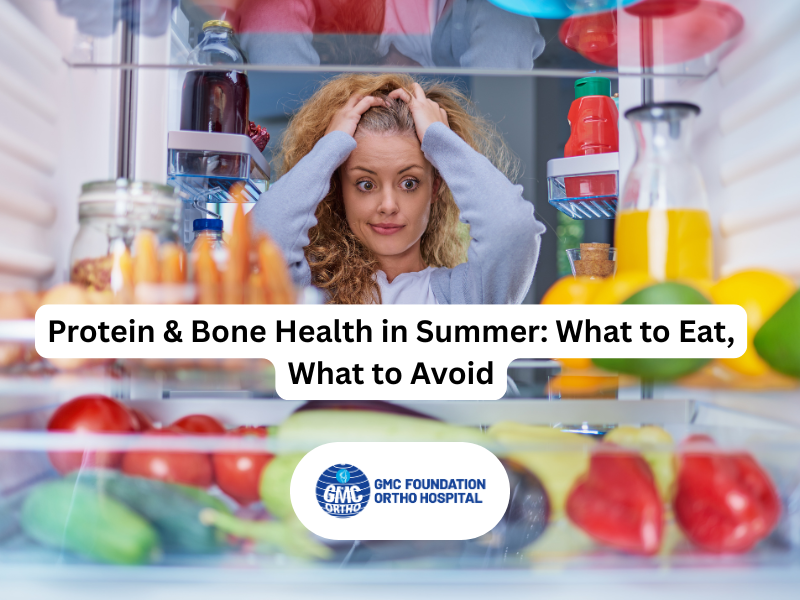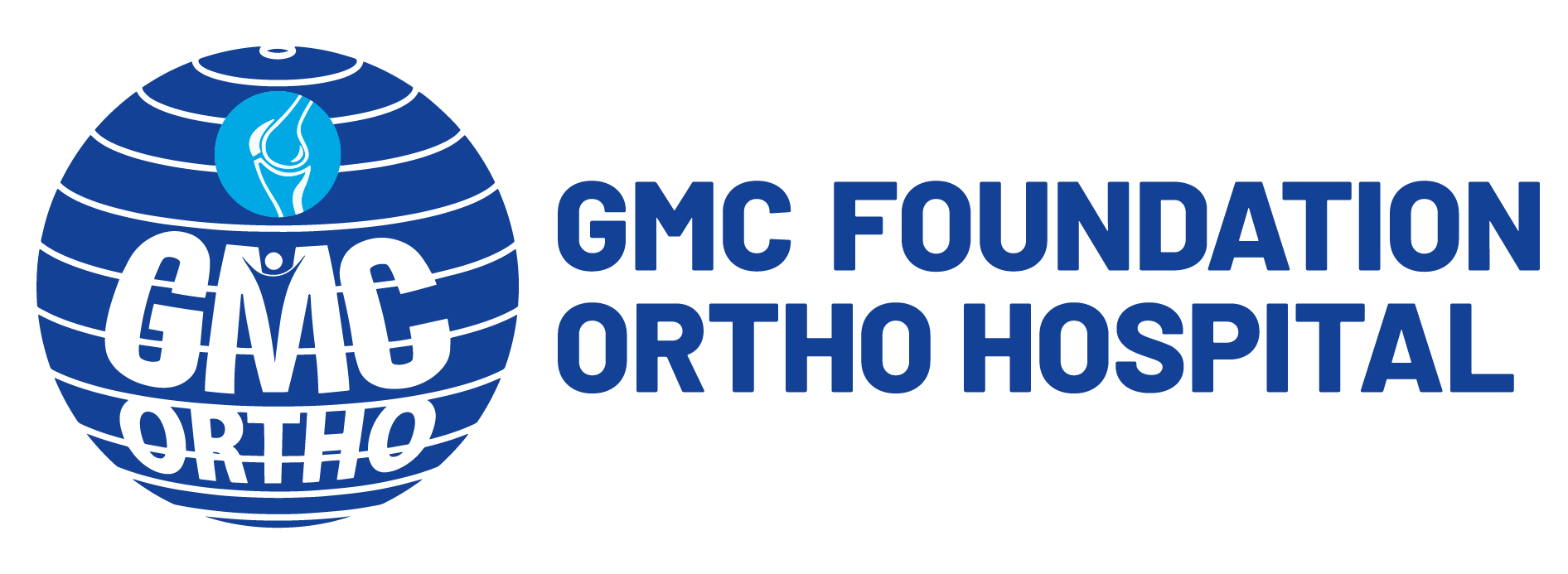Book an Appointment
Note: This is an appointment request only Depending on the availability of the consultant, appointment will be confirmed to you through mail/call The appointment requests can be made minimum 48 hrs in advance

Protein & Bone Health in Summer: What to Eat, What to Avoid
May 1, 2025Protein & Bone Health in Summer: What to Eat, What to Avoid
When we think of bone health, we often focus on calcium and vitamin D—but protein plays an equally crucial role. In fact, your bones are made of about 50% protein by volume. It provides the structural framework upon which minerals like calcium are deposited. And during summer, with increased physical activity, exposure to heat, and dietary shifts, getting the right kind of protein becomes especially important.
This blog will walk you through the relationship between protein and bone health, what to eat in the summer, what to avoid, and tips from orthopedic experts to optimize bone strength in the warmer months.
🦴 Why Protein Matters for Bone Health
Protein is not just for muscles—it's essential for:
-
Bone matrix formation (collagen framework)
-
Calcium absorption and retention
-
Fracture healing and tissue repair
-
Muscle strength, which protects bones and reduces fall risk
Low protein intake is linked to reduced bone mass, slower fracture recovery, and higher risk of osteoporosis—especially in older adults and athletes.
☀️ Summer-Specific Challenges for Protein and Bone Health
Summer brings lifestyle and dietary changes that can affect your bone health:
-
Reduced appetite due to heat
-
Increased sweating leads to loss of electrolytes vital for muscle and bone function
-
More outdoor activity means higher protein needs for muscle and joint recovery
-
More light meals and plant-based choices may be low in complete protein
-
Dehydration can impair nutrient absorption
That’s why it’s important to adjust your protein intake to meet your body’s seasonal demands.
✅ What to Eat: Bone-Friendly Protein Sources in Summer
1. Greek Yogurt & Cottage Cheese
-
High in protein and calcium
-
Cooling, refreshing, and ideal for summer
-
Try in smoothies or fruit bowls
2. Eggs
-
Complete protein with all essential amino acids
-
Vitamin D-rich (especially pasture-raised eggs)
-
Easy to cook and digest in warm weather
3. Grilled Chicken or Fish
-
Lean, high-quality protein
-
Rich in phosphorus, magnesium, and omega-3s (in fatty fish)
-
Serve cold in salads or wraps for a light meal
4. Lentils, Chickpeas & Beans
-
Great plant-based protein
-
High in magnesium and fiber
-
Make chilled lentil salads or hummus
5. Tofu and Tempeh
-
Rich in protein and calcium (especially calcium-set tofu)
-
Easy to marinate and grill
6. Protein-Rich Smoothies
-
Add Greek yogurt, nut butters, or protein powders
-
Combine with banana, berries, and leafy greens for nutrient variety
7. Nuts & Seeds
-
Almonds, chia seeds, pumpkin seeds: excellent sources of protein, magnesium, and healthy fats
-
Sprinkle on salads or eat as a snack
8. Milk and Fortified Plant-Based Milks
-
Traditional milk provides calcium + protein
-
Choose fortified almond or soy milk if vegan (look for added calcium and vitamin D)
❌ What to Avoid (or Limit): Foods That Undermine Bone Health
1. High-Sodium Processed Foods
-
Excess salt causes calcium loss via urine
-
Limit: salty chips, canned soups, frozen dinners
2. Sugary Beverages
-
Soft drinks often contain phosphoric acid, which can disrupt calcium balance
-
Choose water, herbal teas, or electrolyte drinks instead
3. Excess Red Meat
-
Overconsumption may lead to acid buildup, increasing calcium excretion
-
Enjoy in moderation and balance with vegetables and alkaline foods
4. Too Much Caffeine
-
Excess caffeine can impair calcium absorption
-
Limit coffee to 1–2 cups/day and avoid energy drinks
5. Low-Protein Diets
-
Skipping protein due to heat or busy summer routines can be harmful
-
Ensure every meal has a protein component, even if light
💪 How Much Protein Do You Need for Healthy Bones?
Protein needs vary, but a general orthopedic guideline is:
-
Adults: 0.8–1.2 grams of protein per kg of body weight
-
Older adults / healing bones: 1.2–1.5 grams per kg
-
Athletes / active individuals: 1.4–2.0 grams per kg
Example: A 70 kg adult should aim for 56–84g of protein daily, increasing during bone healing or training.
🥤 Hydration Supports Protein Metabolism
Protein metabolism produces nitrogen waste that your kidneys need water to eliminate. In hot weather:
-
Drink 8–12 cups of water daily
-
Add coconut water or oral rehydration after intense activity
-
Pair protein intake with fluids to aid digestion and nutrient delivery
🦴 Orthopedic Tips for Supporting Bone Health This Summer
-
Pair protein with calcium and vitamin D sources in every meal.
-
Split protein across meals—your body absorbs it better in small portions.
-
Incorporate weight-bearing exercises like walking, light resistance training, or yoga to stimulate bone growth.
-
Use protein-rich snacks post-activity to support bone and muscle repair.
-
Check with your orthopedist or dietitian before starting supplements.
📊 Infographic: “Summer Protein for Strong Bones – At a Glance”
Infographic Sections:
| ✅ Eat More Of | ❌ Avoid or Limit |
|---|---|
| Greek yogurt, cheese | Salty snacks, canned soups |
| Eggs | Sugary sodas |
| Grilled chicken/fish | Overconsumed red meat |
| Lentils, beans | High-caffeine drinks |
| Tofu, tempeh | Skipping meals |
| Nuts, seeds | Heavy, greasy summer foods |
Quick Tips:
-
Aim for 20–30g of protein per main meal
-
Hydrate with every protein-rich snack
-
Balance protein with calcium, magnesium, and vitamin D
-
Exercise daily to build bone strength
📝 Final Thoughts
Summer offers a powerful opportunity to fuel your body with nutrient-rich foods that protect and strengthen your bones. By focusing on the right proteins, staying hydrated, and balancing your diet with bone-friendly nutrients, you can build a stronger foundation for your health—season after season.
Stay strong, stay smart, and give your bones the care they deserve this summer.
